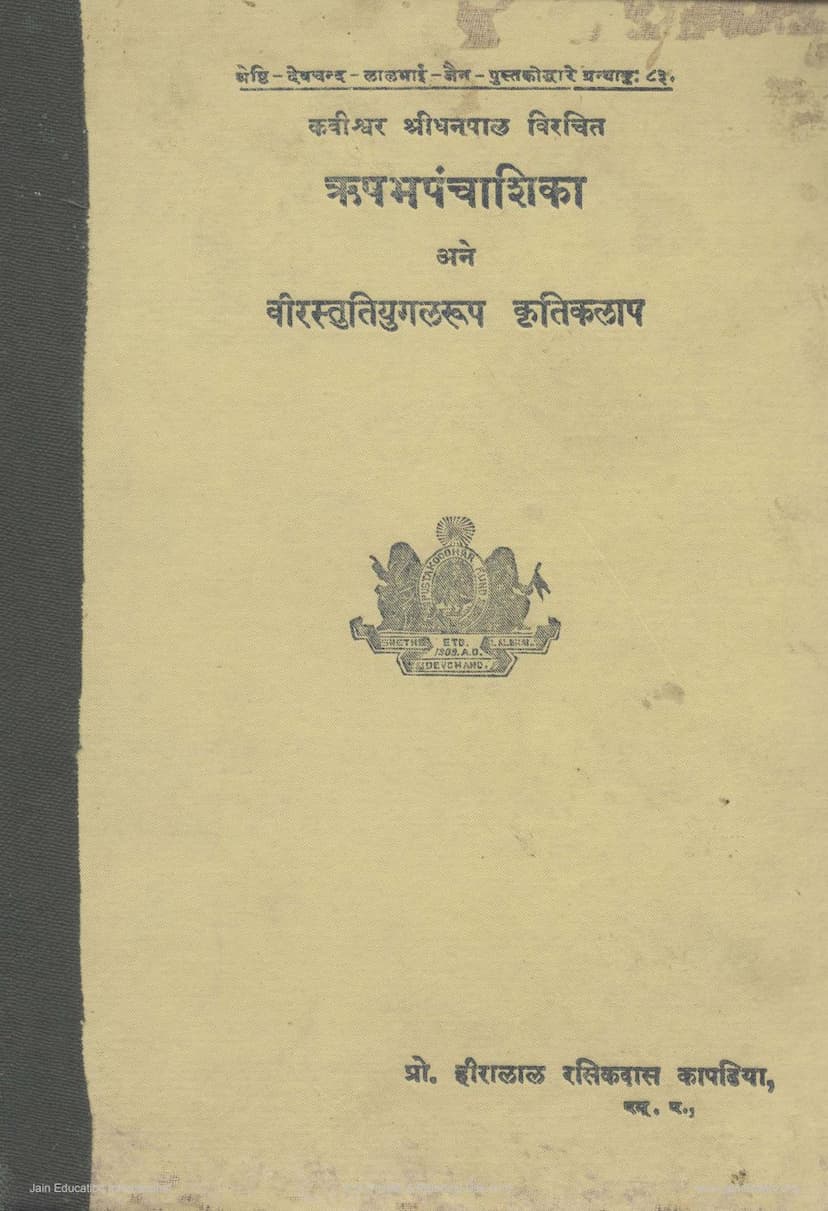Rushabh Panchashika
Added to library: September 2, 2025

Summary
Here is a comprehensive summary of the Jain text "Rushabh Panchashika" by Dhanpal Mahakavi, published by Devchand Lalb'hai Pustakoddhar Fund, based on the provided catalog link and pages:
Book Title: Rushabh Panchashika Author(s): Dhanpal Mahakavi, Hiralal R Kapadia (Editor/Translator) Publisher: Devchand Lalbhai Jain Pustakoddhar Fund Catalog Link: https://jainqq.org/explore/004848/1
Overview:
The "Rushabh Panchashika" is a devotional work attributed to the renowned Jain poet Dhanpal Mahakavi. This particular edition, published by the Devchand Lalbhai Jain Pustakoddhar Fund, is notable for its comprehensive editorial and translational work by Prof. Hiralal Rasikdas Kapadia. The book also includes a "Veer Stuti" (praise of Lord Mahavir), making it a collection of devotional poems dedicated to two significant Tirthankaras of Jainism. The work aims to provide detailed commentary, clarification, and analysis to make these ancient texts accessible to modern readers.
Key Components of the Publication:
-
The Texts:
-
Rushabh Panchashika: This is the primary text, a collection of fifty verses (Panchashika) dedicated to Lord Rishabh (Adinath), the first Tirthankara. The title suggests a focus on fifty verses, though the table of contents on page 9 indicates it's part of a larger collection. The text is presented with its original Prakrit verses.
-
Veer Stuti: This is a collection of verses praising Lord Mahavir, the 24th Tirthankara. It is presented alongside the Rushabh Panchashika, forming a "Veer-stuti Yugal" (pair of praises to Veer).
-
-
Editorial and Translational Work:
- Professor Hiralal Rasikdas Kapadia: Professor Kapadia, a post-graduate lecturer in Ardhamagadhi at the Bhandarkar Oriental Research Institute, is credited with the research, translation, and critical analysis of the text. His contributions include the Gujarati translation and detailed commentary, making the work accessible to Gujarati-speaking readers. His editorial prowess is evident from his previous works like "Nyaykusumanjali" and "Stuti Chaturlamshatika."
-
Commentary and Explanations:
- The book includes a detailed commentary (Tika), clarification (Spashtikaran), and an introduction (Prastavana) to the works. The Prastavana (pages 14-28) by Prof. Kapadia provides extensive background information on Dhanpal Mahakavi, the historical context of the texts, the significance of Prakrit language in Jain literature, and the process of compiling and editing the various manuscripts.
- Prof. Kapadia's introduction meticulously details the various manuscripts he consulted for the "Rushabh Panchashika" and "Veer Stuti," including those from the Jainanand Pustakalaya, the Vidya Shala in Ahmedabad, and the collection of Muni Raj Vir Vijayji. He also mentions the valuable contribution of Upadhyay Shri Dharmashekhar's commentary (Avchurni) obtained from the Bhandarkar Oriental Research Institute.
- The commentary also delves into linguistic aspects, explaining the use of specific Prakrit words, grammatical features, and poetic devices like Upama (simile) and Rupak (metaphor).
-
Content and Structure (from Table of Contents, Page 9):
- Dedication (Samarpan)
- Introduction (Aamukh)
- Editorial Note (Sampadakiy Nivedan)
- Preface (Prastavana)
- Table of Contents (Vishay Suchi)
- Rushabh Panchashika with Tika, translation, etc.
- Shri Veer Stuti with Avchurni, translation, etc.
- Veer Stuti in Sanskrit-Prakrit translation etc.
- Glossary (Shabdakosh)
-
Author Information:
- Dhanpal Mahakavi: A renowned poet celebrated for works like "Tilakmanjari." His contributions to Jain literature are significant. The Prastavana provides biographical details based on various historical accounts, placing him primarily in the 11th century CE, citing works like "Paiyalachchhi Namamala" (Vikram Samvat 1029) and his association with King Bhoj. A special mention is made of the honorific title "Kavishwar" bestowed upon Dhanpal.
-
Publisher and Patronage:
- Sheth Devchand Lalbhai Jain Pustakoddhar Fund: This fund plays a crucial role in preserving and publishing ancient Jain manuscripts. The publication is dedicated to Sheth Devchand Lalbhai Javeri (pages 28-29), a prominent figure in Jain philanthropy and literature preservation.
- The publication is also dedicated to Acharya Maharaj Shri Jinakripachandra Surishwarji of the Kharatargachha tradition, highlighting the support and guidance from religious leaders.
-
Historical Context and Significance:
- The publication aims to revive and make accessible valuable Jain texts.
- Prof. Kapadia's effort signifies a scholarly approach to understanding and disseminating Jain literature, connecting it to the broader context of Prakrit and Sanskrit studies.
- The book was first published in Vikram Samvat 1989 / Vir Samvat 2459 / 1933 CE, with an edition size of 1250 copies.
Summary of the Content (based on the Prastavana and general context):
The "Rushabh Panchashika" and "Veer Stuti" are devotional poems likely composed in Prakrit, praising the virtues and divine qualities of the first and last Tirthankaras respectively. Dhanpal Mahakavi, the author, was a celebrated poet whose works were admired by prominent Jain scholars and ascetics, including Hemchandrasuri.
Prof. Kapadia's extensive introduction highlights the difficulties in establishing Dhanpal's precise timeline but places him around the 11th century CE. The introduction also meticulously details the textual variations and the painstaking process of manuscript comparison and collation. The commentary aims to explain the nuances of the Prakrit language, the philosophical concepts within the verses, and the poetic merits of Dhanpal's compositions. The inclusion of both "Rushabh Panchashika" and "Veer Stuti" offers a dual perspective on Jain devotion, focusing on the foundational Tirthankara and the Tirthankara who revived the faith in the current era. The overall publication is a testament to the dedication of scholars and institutions in preserving and enriching Jain literary heritage.